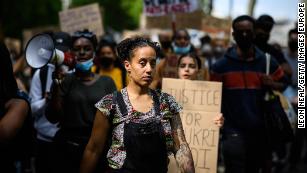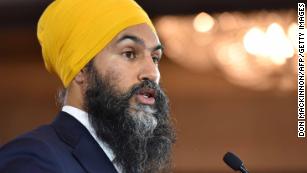Former Member
Indians are being held up as a model minority. That's not helping the Black Lives Matter movement
London (CNN)"White silence is violence." It's a simple but powerful message shouted at Black Lives Matter protests around the world, and it marks a major shift in expectations: it's no longer OK to just not be racist, you have to be vocally anti-racist. If you're not, you're part of the problem.
But what about brown silence? Just as people are being told to acknowledge their White privilege, calls are growing louder for South Asian diasporas, particularly Indians, in the UK, US and Canada to check their brown privilege and speak out against anti-Black racism.
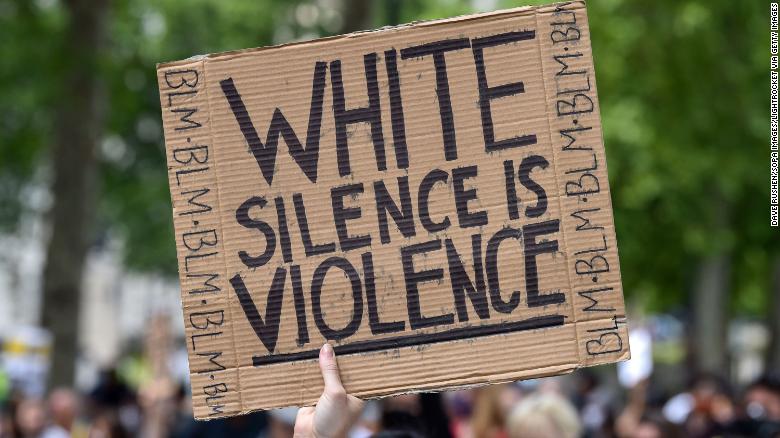
A protester holds up a poster during a Black Lives Matter demonstration in London on June 21.
This tension has arisen in part because some Asian groups are still being held up as "model minorities," celebrated for achieving higher levels of socio-economic success than others, often even the White majority. It's an old tactic that has proven to cause more harm than good, but it's one that is still very much in use.
The problem with the practice is that it pits ethnic minority groups, which could otherwise be allies, against each other. It perpetuates stereotypes in and outside the group and, worst of all, it gives governments, companies and institutions of power a mask for their own systemic racism. It completely ignores the fact that one minority group may face very different challenges or levels of racism than another.
Many British media reports have pointed to the Indian diaspora's success in the country: British-Indian graduates in England and Wales, on average, earn more than most other ethnic minority groups, even slightly more than the White majority, government data shows. They achieve better results in primary and high school than the White majority, often second only to British-Chinese students. And they are arrested less often than White people.
Black people, on the other hand, earn less than most other groups after graduating, achieve among the lowest levels in primary and high school, and are over three times more likely to be arrested than White people. Similar trends have been noted in the US and Canada.
There are many ways to digest this kind of data. Some look at it as a clear sign more needs to be done to tackle structural racism and close the gap, but all too often, it is used to congratulate those who have found success, and shame those who haven't.
Take UK Prime Minister Boris Johnson's Cabinet of ministers, for example, which he has touted as the country's most diverse in history. But really, a look at its makeup shows it's simply the most Indian Cabinet, with three ministers of Indian descent.
The tension that has created was brought to the fore in parliament earlier this month, when Home Minister Priti Patel, who has Indian origins, dismissed Black opposition MP Florence Eshalomi, who was complaining the ruling Conservative government was not taking structural racism seriously.
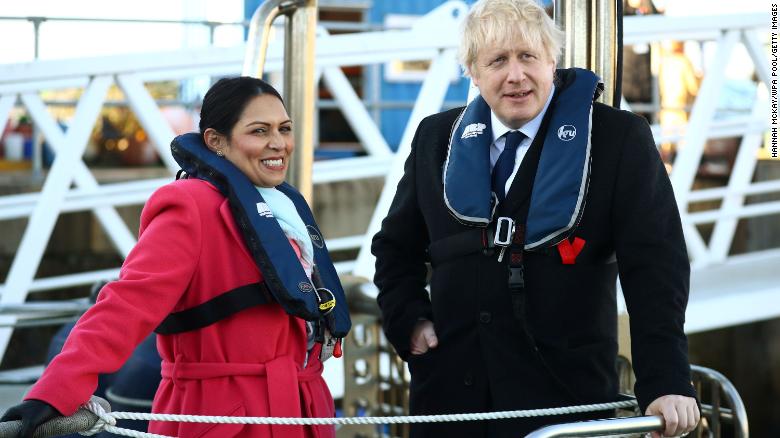
UK Home Secretary Priti Patel, left, with Prime Minister Boris Johnson on board a security vessel at the Port of Southampton on December 2, 2019.
Patel's response was defensive and aggressive, arguing she too had suffered racism so "will not take lectures" on the issue. It was her way of saying that because she had been the victim of racism, she could not possibly be ignorant of the problems Black British people face.
Joan Doe, a Black high school teacher from London, said she found Patel's response frustrating. She also said the Prime Minister's recent appointment of Munira Mirza to lead another diversity review in the country was problematic.
Doe says her problem isn't so much that Mirza is of Pakistani origins, more that she is known to argue that structural racism doesn't exist, as she has written in several articles for the right-wing publication Spiked.
"They think they can just put a brown face to the problem and it will go away. And it's always a Brown face that's not too dark, not too light, so they can say they are representing ethnic minority groups," Doe told CNN.
She said that there was an issue in pooling all ethnic minorities under terms like BAME (Black, Asian and minority ethnic) and POC (People of Color).
"We all get banded together, and that just says that because you're not White, you must all have similar experiences and therefore must have similar outcomes, which is just completely untrue," Doe said.
UK: 'POC silence is violence'
It must be pointed out too that in the UK, South Asians' experiences are varied, and just as not all White people have led lives of privilege, neither have all Brown people. Where Indians, on average, do well financially and in education, Pakistanis and Bangladeshis haven't enjoyed the same socio-economic mobilization, on the whole, and many have borne the brunt of a wave of Islamophobia that swept the world following the 9/11 attacks. And even within ethnic groups, there are such diverse stories and different backgrounds that so many people simply don't fit the picture the data paints.
But some in these diasporas who have had privileges are starting to recognize them, and young South Asians are beginning to speak up about them. Uncomfortable discussions on issues like the hierarchy of racism are taking place, and just as people are now discussing how national heroes, like Winston Churchill in the UK, held deeply racist views, Indian diasporas are now acknowledging Mahatma Gandhi's anti-Black racism, revealed in some of his writings during his time spent in South Africa.
Jaskaran Sahota, a 34-year-old advertising executive and an amateur comedian, has attended Black Lives Matter protests in London. She carries a poster that say "POC silence is violence" and is part of a movement of British South Asians trying to change racist attitudes within their communities, particularly among the generation before them.
She points to the way Indians will often attribute their success to simply working hard, and while there may be some truth to that, few stop to consider that other groups may be working hard too and just face other structural barriers.
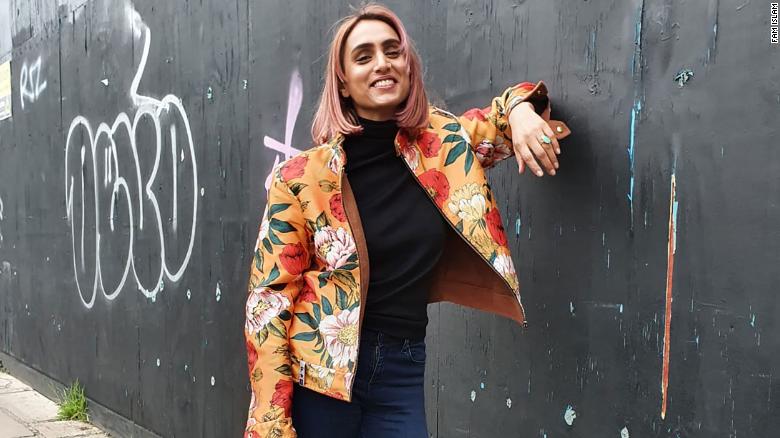
Jaskaran Sahota from London says Indians in the country need to face up to "colorist" attitudes.
She laments the way Indians have been able to find social mobility but don't often help elevate other minority groups in the same way.
"Unfortunately, brown people got a seat at the table and kicked down the other chairs. What they should have done was dismantle it or bring more chairs. That's what I see when I see Priti Patel. She took the benefits of BAME and none of the responsibility," Sahota said.
Many have retained the "colorist" attitudes they or their families had in India, she said, where those with lighter skin typically benefited, while darker-skinned Indians faced more discrimination, a hierarchy validated by the Hindu caste system.
In the UK, that has translated to anti-Black racism among some Indians.
"South Asians can be inherently colorists. Some don't like people who are darker because that means as people, they are less morally worthy. It's an inherent bias, as if God doesn't like people with darker skin," she said.
"The UK didn't teach us that. We need to own that. We're nasty that way, so let's deal with that."
US: A call to Indian-Americans
There are similar calls coming from young Indians in the United States. A Tik Tok video by Indian-American Rishi Madnani that was widely shared last month deconstructs the problem with the model minority myth, which still pervades in some corners of the country.
In it, Madnani points to the fact that many Indians moved to the United States during a wave of migration between 1965 and 1990 under visa programs that targeted skilled and highly educated people. In contrast, many Black Americans' ancestors were forcibly taken to the country as slaves.
"Because of this we were pre-determined to be successful and when we were, the media painted us as model minorities, as good, law-abiding citizens that were the opposite of Black people," he says, adding that many Indian-Americans had been "fooled by the model minority myth."
"Yes, South Asians face ignorance, casual racism and hate crimes, but we have never in American history been systematically dehumanized and oppressed in the way that Black people have."
What Madnani does is offer some context, as simplified as it may be, as to why there may be differences in Black and Asian experiences in the United States. But there are still comparisons being made between ethnic minority groups in the country with no context at all.
Charles Negy, a psychology professor from the University of Central Florida, sent a series of tweets recently dismissing criticisms of US structural racism by comparing Asian Americans and Black Americans.
"If Afr. Americans as a group, had the same behavioral profile as Asian Americans (on average, performing the best academically, having the highest income, committing the lowest crime, etc.), would we still be proclaiming 'systematic racism' exists?" he wrote in a tweet that has since been deleted.
The university issued a statement condemning his comments "in the strongest terms" and have launched an inquiry into his remarks and other matters.
Negy defended his remarks in a New York Times interview, saying he was critical of all ethnic and cultural groups. "There is no way I can be brutally honest about each racial/cultural group without offending someone."
Canada: Brown 'silence has been absolutely deafening'
In Canada too, where protests have highlighted disproportionate police violence against Black and Indigenous Canadians, discussions around Brown privilege are starting to take place.
The leader of Canada's New Democratic Party, Jagmeet Singh, was kicked out of a session in parliament earlier this month after calling another politician racist.
Singh made the accusation in the House of Commons after Alain Therrien, from the Bloc Québécois party, rejected a motion acknowledging the existence of systemic racism in the Royal Canadian Mounted Police force.
Bloc Québécois defended Therrien, saying in a statement that he voted against the motion because another committee was already studying the issue, Canada's public broadcaster CBC reported.
And during a panel discussion in Toronto earlier this month on "Brown complicity in White supremacy," Canadians of South Asian origins came together to talk about issues such as brown silence, brown fragility and the continuation of the model minority myth.
Herveen Singh, an education administration expert from Canada now working at the Zayed University in Dubai, said: "Essentially, the model minority myth was created to take attention away from the enslavement of Black people and replace it with 'you're just not working hard enough,' not taking into account the hundreds of years of slavery, the eugenics project, that firmly puts White people at the top of the hierarchy and gives them license to dehumanize Black people, who are firmly at the bottom of this racial hierarchy," she said, adding that brown people were usually placed "somewhere in the middle."
"When Black communities are under siege, where are we? Where is collective brown solidarity for Black lives? Till now, the silence has been absolutely deafening."
It's something that Nodin Nganji, a Burundian student studying international development in Toronto, has also noticed. In a recent tweet, he shared Madnani's Tik Tok video and called on brown people in Canada to join protests and check their privilege.
"When it comes to protests that I've been part of here in Toronto, or ones that I saw in the media in Ottawa or Vancouver or Montreal, there were mostly two races -- Black and White. Yes, there were a few Asians, but very, very few," Nganji told CNN.
"I see Black people raising posters, I see white people raising posters. I see very few Brown people engaging in these conversations, or protesting, or donating, or speaking out. I don't think many even recognize their privilege. I know we have some Asian people who are our allies, but from my end it's not enough."
CNN's Tara John contributed to this story.


